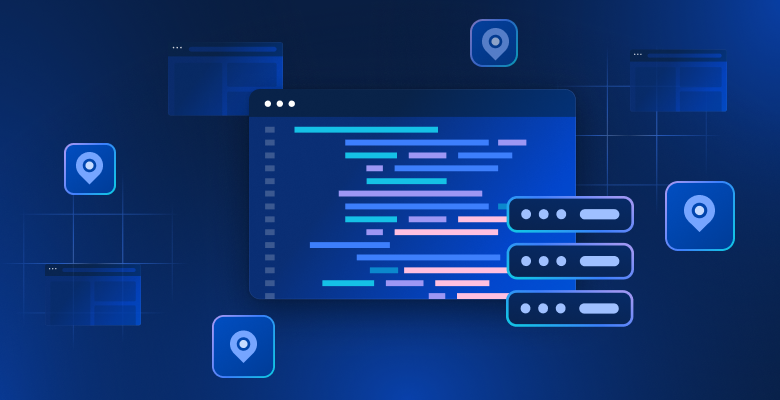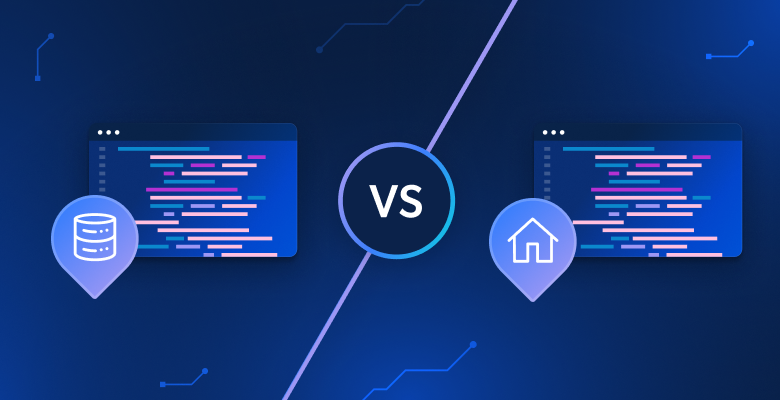In this article on the best proxy providers, you will learn:
- What a proxy provider is
- What aspects to analyze when evaluating proxy providers
- What the top 10 proxy providers on the market are
Let’s dive in!
What Is a Proxy Provider?
A proxy provider offers access to proxy servers worldwide, which act as intermediaries between users and the internet. Proxy servers hide users’ IP addresses, enhancing privacy, security, and anonymity while enabling access to geo-restricted content. They can also improve internet performance by caching frequently accessed content. Common uses include web scraping, price monitoring, ad verification, bypassing censorship, and accessing restricted streaming services.
Best Overall Proxy Provider: Bright Data
Bright Data stands out as the most comprehensive proxy provider, offering an unmatched global network of over 150M IPs across residential, datacenter, ISP, and mobile proxies. With advanced features like CAPTCHA solving, robust scraping tools, and high scalability, it’s the top choice for businesses of all sizes. Its flexible pricing, ethical practices, and 24/7 customer support make Bright Data the best overall solution for proxy needs.
Top 10 Proxy Providers
Time to see the 10 best proxy sites compared and ranked based on the criteria presented earlier.
1. Bright Data

Bright Data is the leading proxy provider in the market. In business since 2014, its proxy network boasts millions of reliable, large, and ethical IPs around the entire globe. This includes all proxy services, residential, datacenter, mobile, and ISP proxies on both shared and private servers. These servers can route traffic over the HTTP, HTTPS, and SOCKS protocols.
In addition to that huge network, the provider offers some of the best tools and products for web scraping, data monitoring, ad verification, and many other use cases. Specifically, Bright Data controls the best web scraping proxies.
Bright Data’s services are aimed at both individuals and businesses, with all-in-one plans and pay-as-you-go pricing models. The provider prioritizes transparency with its strict KYC policy and also supports ethical practices through the Bright Initiative. Visitors, new users, and current customers all have a great experience through fast and responsive customer support, even on a free trial. Overall, these aspects make Bright Data the best proxy provider.
- Proxy types: Residential proxies, datacenter proxies, ISP proxies, mobile proxies, both shared and dedicated
- Network size: 150+ million IPs in 195+ countries, with city, ZIP code, carrier, and ASN geotargeting
- Supported protocols: HTTP, HTTPS, SOCKS
- Uptime: 99.99%, but can reach 100% with the 100% uptime feature
- Success Rate: 99.9%
- Number of customers: Over 20k, including partners like Microsoft, McDonald’s, EPSON, and others
- Customer support: 24/7 live chat, email support, ticketing, media inquiries to answer all your questions, sales inquiries to support current users and visitors, dedicated account manager for enterprises
- G2 review score: 4.6/5
- Free trial: 7-day free trial available
- Pay-as-you-go plan: Yes, on all types of proxies
- Residential proxy pricing: Starting from $5.04/GB
- Products and features: Proxy management dashboard with real-time stats, proxy manager desktop application, free proxies, downloadable datasets, browser extensions, Scraping Browser API, Web Scraper IDE, Web Scraper API, SERP API, Web Unlocker, and much more
2. Decodo (Smartproxy)
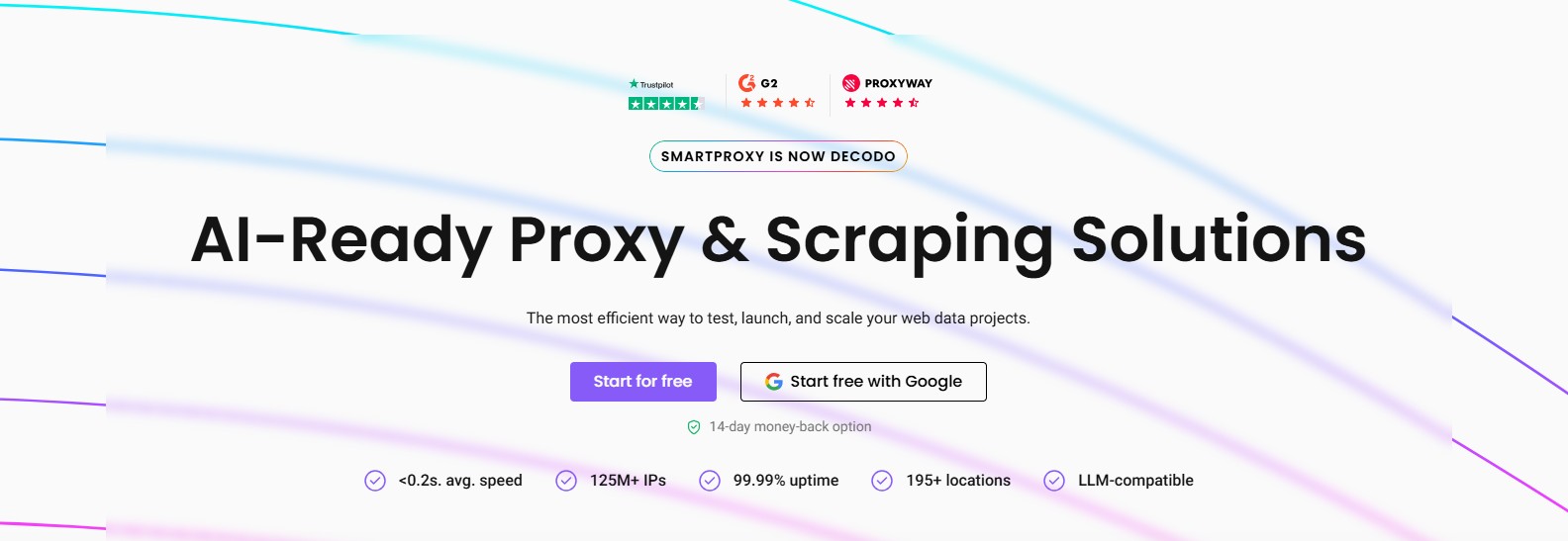
Decodo does not have a proxy network as extensive as Bright Data’s. At the same time, it emerges as an excellent provider of robust and versatile proxy servers. Its prices are not among the best on the market, but at least there is a free trial and a pay-as-you-go plan. The provider offers the types of proxy servers, on the HTTP, HTTPS, and SOCKS protocols.
- Proxy types: Residential proxies, datacenter proxies, ISP proxies, mobile proxies, both shared and dedicated
- Network size: 65+ million IPs in 195+ countries, with geotargeting
- Supported protocols: HTTP, HTTPS, SOCKS
- Uptime: 99.99%
- Success Rate: 99.47%
- Number of customers: Undisclosed
- Customer support: 24/7 live chat, email support, sales inquiries, dedicated account manager for enterprises
- G2 review score: 4.6/5
- Free trial: 3-day free trial only for residential proxies
- Pay-as-you-go plan: Only on residential and mobile proxies
- Residential proxy pricing: Starting from $7/GB
- Products and features: User proxy management dashboard, free webinars and guides, browser extensions, anti-detection browser, site unblocker, no-code scraper, scraping API, free proxy checker
3. Oxylabs

Oxylabs controls one of the largest and fastest proxy server networks in the industry. However, its prices are quite high and may not fit the budget of small companies or individual developers. A customer base of 3,500 is good, but far less than that of Bright Data. What the two providers have in common is mandatory card ID verification to access proxy services.
- Proxy types: Residential proxies, datacenter proxies, ISP proxies, mobile proxies, both shared and dedicated
- Network size: 100+ million IPs in 195+ countries, with geotargeting
- Supported protocols: HTTP, HTTPS, SOCKS
- Uptime: 99.9%
- Success Rate: 99.9%
- Number of customers: Over 3.5k customers, including partners like Trivago, SEON, Debunk.org
- Customer support: 24/7 live chat and email support
- G2 review score: 4.5/5
- Free trial: 7-day free trial only for business
- Pay-as-you-go plan: Only on mobile and residential proxies
- Residential proxy pricing: Starting from $8/GB
- Products and features: Proxy management dashboard, free guides and webinars, downloadable datasets, dedicated scraping APIs
4. SOAX

SOAX is the only provider that advertises a proxy network with more than 155 million proxy IPs. Whether this number is true is hard to say. Anyway, more than 10,000 customers decided to choose the provider. What is certain is the absence of both a free trial and a pay-as-you-go plan. The entry price of $99 a month, the concurrency limitations, and the ISP proxies only in the United States do not allow it to be among the top 3 best proxy providers.
- Proxy types: Residential proxies, datacenter proxies, ISP proxies (only in the US), mobile proxies, both shared and dedicated
- Network size: 155+ million IPs (advertised) in 195+ countries, with geotargeting
- Supported protocols: HTTP, HTTPS, SOCKS
- Uptime: 99.9%
- Success Rate: 99.5%
- Number of customers: Over 10k
- Customer support: 24/7 live chat, email support, dedicated customer success manager for large enterprises
- G2 review score: 4.9/5
- Free trial: No, a $1.99 trial is available
- Pay-as-you-go plan: No
- Residential proxy pricing: Starting from $99/month ($6.6/GB)
- Products and features: Online platform for proxy management, Web Unblocker, Scraping APIs
5. NetNut

NetNut has a very large proxy network. It boasts support for all types of proxies and offers more than 85 million proxy IPs. The problems are the entry price of $100 per month, the complete absence of a pay-as-you-go plan, and a not well-defined number of customers.
- Proxy types: Residential proxies, datacenter proxies, ISP proxies, mobile proxies, both shared and dedicated
- Network size: 85+ million IPs in 200+ countries, with geotargeting
- Supported protocols: HTTP, HTTPS, SOCKS
- Uptime: 99.9%
- Success Rate: 99%
- Number of customers: Undisclosed
- Customer support: 24/7 support, ticketing, email support, dedicated customer support manager for enterprises
- G2 review score: 4.9/5
- Free trial: 7-day free trial available
- Pay-as-you-go plan: No
- Residential proxy pricing: Starting from $300/month ($15/GB)
- Products and features: Online platform for proxy management, SERP Scraping API, Social Scraper, Website Unlocker
6. IPRoyal
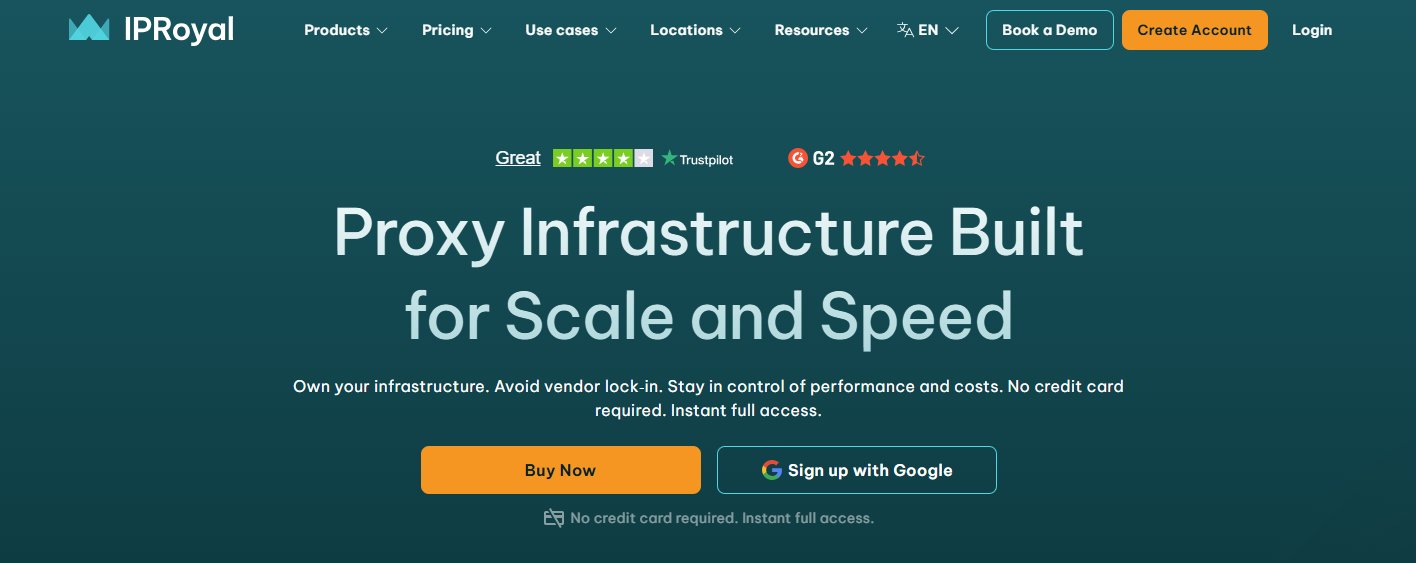
IPRoyal is a proxy provider that excels when it comes to SOCKS5 proxy servers and for its modern customer support, also available via Discord. Proxy plans can be configured directly on the site before purchase, but there is no free trial. What limits the provider considerably is its small complementary product offering, which is limited to the bare minimum.
- Proxy types: Residential proxies, datacenter proxies, ISP proxies, mobile proxies, both shared and dedicated
- Network size: 34+ million IPs in 195+ countries, with geotargeting
- Supported protocols: HTTP, HTTPS, SOCKS
- Uptime: 99.9%
- Success Rate: Undisclosed
- Number of customers: Over 10k
- Customer support: 24/7 live chat, email and Discord support
- G2 review score: 4.4/5
- Free trial: No
- Pay-as-you-go plan: Yes, but only for residential proxies
- Residential proxy pricing: Starting from $7/GB
- Products and features: Online platform for proxy management, browser extensions, free proxy tester, free proxy list
7. Webshare

Webshare offers a good amount of datacenter, ISP, and residential IPs, but has no mobile proxies. As a pure proxy provider, it does not provide extra products and tools, which is bad for its users. It does not have a free trial, but it does offer a free plan with 10 proxies. That is quite unusual for services in this industry, especially considering that free proxies are typically unreliable and data-greedy.
- Proxy types: Residential proxies, datacenter proxies, ISP proxies, both shared and dedicated
- Network size: 30+ million IPs in 195+ countries, with geotargeting
- Supported protocols: HTTP, HTTPS, SOCKS
- Uptime: 99.9%
- Success Rate: 99%
- Number of customers: Over 55k, including users on a free plan
- Customer support: Email support
- G2 review score: 4.8/5 (only 2 reviews)
- Free trial: No, but free plan available
- Pay-as-you-go plan: No
- Residential proxy pricing: Starting from $7/month
- Products and features: Online platform for proxy management, verified proxy servers, free proxy list
8. Oculus Proxies
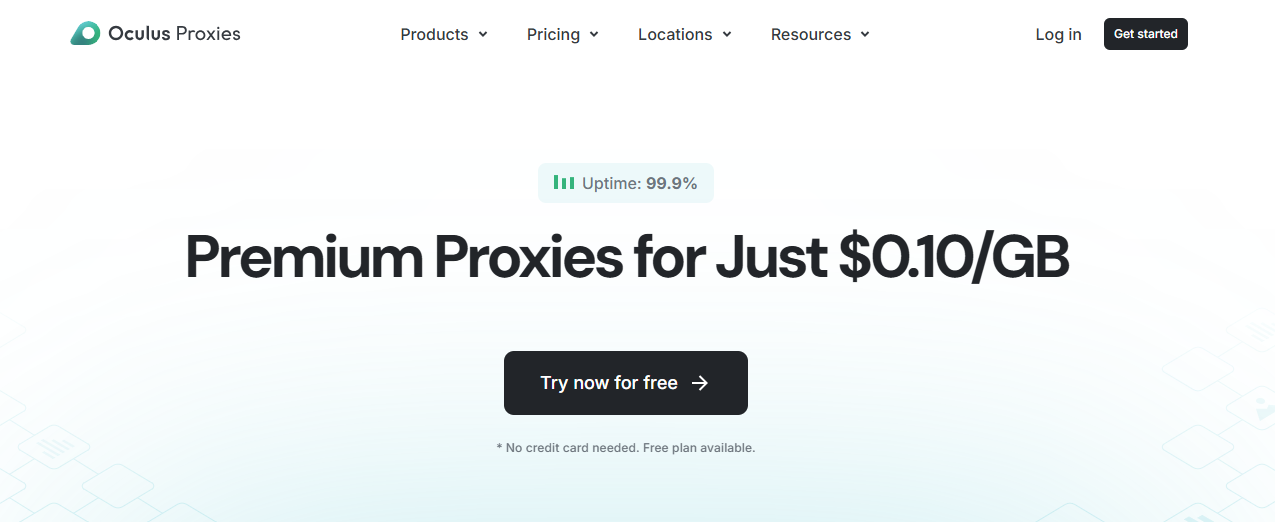
Oculus Proxies offers shared & dedicated datacenter, ISP, and residential proxies with coverage in 150+ countries, 99.99% uptime, and speeds up to 100GBPS. Plans start at $0.96/GB, with no KYC required and a free trial (no credit card). A simple dashboard and built-in proxy tester make it easy to manage usage—ideal for data scraping, ad verification, and more.
- Proxy types: Residential proxies, datacenter proxies, ISP proxies, both shared and dedicated.
- Network size: Extensive network with millions of IPs globally, offering geotargeting.
- Supported protocols: HTTP, HTTPS, SOCKS5.
- Uptime: 99.9%.
- Success Rate: High success rate (specific numbers not disclosed).
- Number of customers: Thousands of satisfied customers globally.
- Customer support: 24/7 live chat, ticket system, and comprehensive documentation.
- G2 review score: N/A (not publicly listed on G2 at this time).
- Free trial: Yes, available for shared datacenter proxies.
- Pay-as-you-go plan: Not specified.
- Residential proxy pricing: Starts from $1/GB
- Products and features: Proxy management platform, support for sneaker bots, social media scraping, and other use cases requiring high anonymity and speed.
9. Rayobyte

Rayobyte has one of the smallest proxy server infrastructures among the best proxy providers. Available IPs do not even reach one million, and just over 100 cities are available. The network encompasses all four types of proxies and there is a free trial, though incredibly limited. The offering is complemented by a tool for performing web scraping. G2 does not have reviews for this company.
- Proxy types: Residential proxies, datacenter proxies, ISP proxies, mobile proxies, both shared and dedicated
- Network size: Thousands of IPs in 130+ locations, with geotargeting
- Supported protocols: HTTP, HTTPS, SOCKS
- Uptime: 99.9%
- Success Rate: 98.6%
- Number of customers: Undisclosed
- Customer support: 24/7 live chat, tickets, email support
- G2 review score: — (not available)
- Free trial: Yes, but only 50 MB limited of traffic
- Pay-as-you-go plan: Yes, but only for residential proxies
- Residential proxy pricing: Starting from $7.5/GB
- Products and features: Online platform for proxy management, Scraping Robot, IPv6 support
10. Toolip
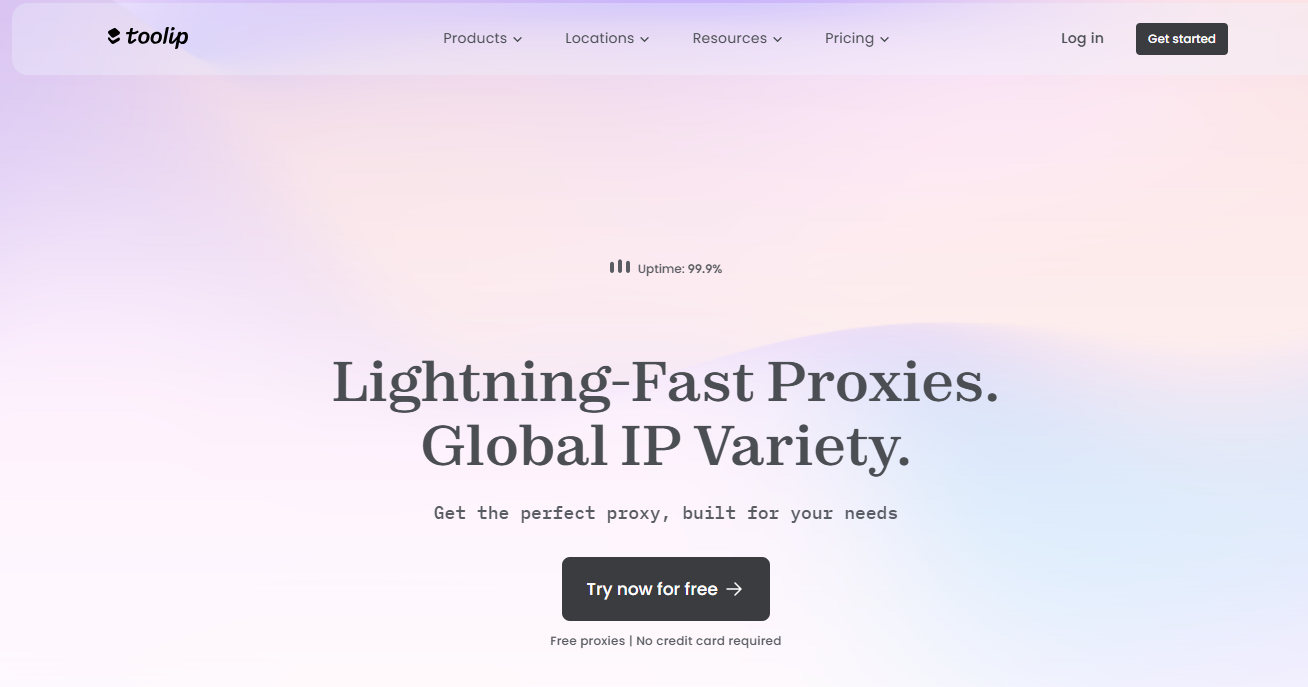
Toolip claims to have over 70 million proxies across 195 countries, offering datacenter, ISP, and rotating residential options. A free 1-week trial (limited to 5 proxies) is provided, though it may be a bit restrictive for larger needs. The service comes with built-in features like a real-time usage dashboard and a proxy tester. G2 does not currently list any reviews for this provider.
- Proxy types: Residential proxies, datacenter proxies, ISP proxies, both shared and dedicated.
- Network size: Millions of IPs with extensive geotargeting options.
- Supported protocols: HTTP, HTTPS, SOCKS5.
- Uptime: 99.9%.
- Success Rate: Consistently high (specific metrics not disclosed).
- Number of customers: Hundreds of business customers across various industries.
- Customer support: Dedicated support through chat, tickets, and detailed guides/documentation.
- G2 review score: N/A (not publicly listed on G2 at this time).
- Free trial: Yes, there is free plan for all proxy type.
- Pay-as-you-go plan: Yes, flexible options tailored to customer needs.
- Residential proxy pricing: Start from $1.3/GB
- Products and features: Advanced proxy management tools, APIs for data collection, support for compliance monitoring, and integration with third-party tools.
Best Proxy Providers: Summary Table
Find out the top proxy providers and why they are on the list with the summary table below:
| Provider | Proxy Types | Network Size | Supported Protocols | Uptime | Success Rate | Number of Customers | G2 Review Score | Free Trial | Pay-As-You-Go Plan | Pricing |
| Bright Data | Residential, datacenter, ISP, mobile | 150+ million | HTTP, HTTPS, SOCKS | 100% | 99.9% | 20k+ | 4.6/5 | ✔️ | ✔️ | Starting from $5.04/GB |
| Decodo | Residential, datacenter, ISP, mobile | 65+ million | HTTP, HTTPS, SOCKS | 99.99% | 99.47% | — | 4.6/5 | Only for residential proxies | Only for residential and mobile proxies | Starting from $7/GB |
| Oxylabs | Residential, datacenter, ISP, mobile | 100+ million | HTTP, HTTPS, SOCKS | 99.9% | 99.9% | 3.5k+ | 4.5/5 | Only for businesses | Only for mobile and residential proxies | Starting from $8/GB |
| SOAX | Residential, datacenter, ISP, mobile | 155+ million | HTTP, HTTPS, SOCKS | 99.9% | 99.5% | 10k+ | 4.9/5 | ❌ | ❌ | Starting from $99/month ($6.6/GB) |
| NetNut | Residential, datacenter, ISP, mobile | 85+ million | HTTP, HTTPS, SOCKS | 99.9% | 99% | — | 4.9/5 | ✔️ | ❌ | Starting from $300/month ($15/GB) |
| IPRoyal | Residential, datacenter, ISP, mobile | 34+ million | HTTP, HTTPS, SOCKS | 99.9% | — | 10k+ | 4.4/5 | ❌ | Only for residential proxies | Starting from $7/GB |
| Webshare | Residential, datacenter, ISP | 30+ million | HTTP, HTTPS, SOCKS | 99.9% | 99% | 55k+ (including users on a free plan) | 4.8/5 (2 reviews) | ❌ (but free plan available) | ❌ | Starting from $7/month ($7/GB) |
| Oculus Proxies | Residential, Datacenter, ISP | Millions of IPs globally | HTTP, HTTPS, SOCKS5 | 99.9% | — | Thousands | — | ✔️ | Not specified | Starting from $1/GB |
| Rayobyte | Residential, datacenter, ISP, mobile | Thousands | HTTP, HTTPS, SOCKS | 99.9% | 98.6% | — | — | ✔️ (very limited) | Only for residential proxies | Starting from $7.5/GB |
| Toolip | Residential, Datacenter, ISP | 70+ million IPs across 195 countries | HTTP, HTTPS, SOCKS5 | 99.9% | — | Hundreds | — | ✔️ | ✔️ | Starting from $1.3/GB |
What to Consider When Selecting the Best Proxy Providers
Here are the main elements to evaluate when comparing the best proxy providers on the market:
- Proxy types: The proxy IP types provided by the company (e.g. residential proxies, datacenter proxies, ISP proxies, mobile proxies), and whether they are shared or dedicated. The more types of proxies are available to users, the more use cases the provider covers.
- Proxy network: The number of proxy IPs in the network and the locations they are available on. The larger and wider the network, the greater the chances of overcoming geographical limitations and finding a fast server near the user.
- Supported protocols: The type of traffic supported by the provider’s proxy servers.
- Uptime: The percentage of server availability guaranteed by the proxy provider. This is a good indication of the provider’s responsiveness in case of downtime and fatal errors.
- Success rate: The percentage of requests that go through proxy servers successfully. The higher it is, the fewer errors end users will encounter when routing traffic through the provider’s proxy servers.
- Number of customers: The number of companies served by the provider. Only the best proxy providers are transparent about the number of clients and what they are.
- Customer support: The provider’s willingness to solve user problems and guide visitors to the correct offering. The more support channels available, the better for the customer.
- G2 review score: What the users say about the provider on G2.com. The opinion of users is essential to get an idea of the quality of service offered by the provider.
- Free trial: The presence of a trial period that users can benefit from to test the proxy services offered by the provider before purchasing them.
- Pay-as-you-go plan: The presence of a pay-as-you-go plan to prove the provider’s interest in supporting even individual developers or small businesses that have occasional needs for proxy servers.
- Pricing: The price of the most affordable plan for accessing proxy services.
- Products and features: The list of all other products, services, and features that complement the proxy offerings. The products of a proxy provider can support marketers, developers, decision-makers, data scientists, and more.
Find out more in our guide on how to choose the best proxy provider. Interested in the best residential proxy providers? Go over this guide.
Conclusion
This guide explains what a proxy provider is, how it works, and what elements to consider when evaluating proxy services. We then applied these criteria to select a list of the best proxy providers. As it turned out here, Bright Data is the most complete proxy company in the industry.
Bright Data controls the best proxy servers in the world, serving Fortune 500 companies and over 20,000 customers. Its worldwide proxy network involves:
- Residential proxies – Over 150M residential IPs in more than 195 countries
- Datacenter proxies – Over 1.3M datacenter IPs
- ISP proxies – Over 1.3M ISP IPs
- Mobile proxies – Over 7M mobile IPs
Overall, that is one of the largest and most reliable scraping-oriented proxy networks on the market.
Start your free proxy trial now or talk to one of our sales reps and see which of Bright Data’s products best suits your needs.



